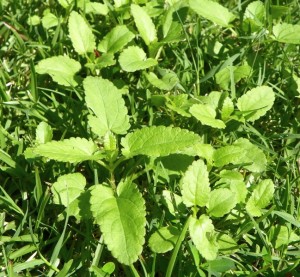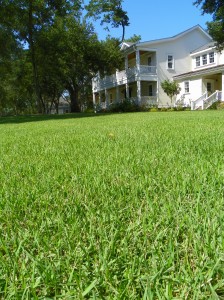Fall Lawn Care Tips and Tasks
go.ncsu.edu/readext?184342
en Español / em Português
El inglés es el idioma de control de esta página. En la medida en que haya algún conflicto entre la traducción al inglés y la traducción, el inglés prevalece.
Al hacer clic en el enlace de traducción se activa un servicio de traducción gratuito para convertir la página al español. Al igual que con cualquier traducción por Internet, la conversión no es sensible al contexto y puede que no traduzca el texto en su significado original. NC State Extension no garantiza la exactitud del texto traducido. Por favor, tenga en cuenta que algunas aplicaciones y/o servicios pueden no funcionar como se espera cuando se traducen.
Português
Inglês é o idioma de controle desta página. Na medida que haja algum conflito entre o texto original em Inglês e a tradução, o Inglês prevalece.
Ao clicar no link de tradução, um serviço gratuito de tradução será ativado para converter a página para o Português. Como em qualquer tradução pela internet, a conversão não é sensivel ao contexto e pode não ocorrer a tradução para o significado orginal. O serviço de Extensão da Carolina do Norte (NC State Extension) não garante a exatidão do texto traduzido. Por favor, observe que algumas funções ou serviços podem não funcionar como esperado após a tradução.
English
English is the controlling language of this page. To the extent there is any conflict between the English text and the translation, English controls.
Clicking on the translation link activates a free translation service to convert the page to Spanish. As with any Internet translation, the conversion is not context-sensitive and may not translate the text to its original meaning. NC State Extension does not guarantee the accuracy of the translated text. Please note that some applications and/or services may not function as expected when translated.
Collapse ▲Lawns in southeastern North Carolina are suited to warm season turf grasses such as St. Augustine, zoysia, bermuda and centipede. Caring for warm season turf grasses is very different from caring for turf grasses grown in cooler climates. As warm season lawns get ready to transition into the dormant winter season, there are some important things that should be done, and others that should not be done, to keep lawns healthy.
Do NOT Fertilize!
Grasses should only be fertilized with nitrogen when they are actively growing. For warm season grasses this is during the spring and summer, not fall or winter. Fertilizing warm season lawns in fall or winter wastes fertilizer, encourages weed growth, and can intensify disease problems like large patch. In the cooler parts of NC and the United States, cool season grasses such as fescue and Kentucky bluegrass are grown. Cool season grasses do grow during the fall and early spring, and require fertilization at these times. Commercials and ads about fertilizing lawns in fall are referring to cool season grasses only.
Do NOT Water!
Warm season lawns should not be irrigated after early September. Fall is the time when warm season lawns are shutting down for winter. Continuing to irrigate lawns during fall can increase cold injury during winter and encourage disease problems. The only exception to this would be if we were experiencing a fall drought, which is not the case this year.
DO Control Weeds
Just as there are warm and cool season grasses, there are also warm and cool season weeds. Cool season weeds come up in the fall, live through winter, then flower and die in the spring. Most cool season weeds are annuals, coming up each year from seed, but a few are perennials. Cool season perennial weeds come back from year to year from roots that persist in the soil. Two of the most troublesome, Florida betony and wild onion, have started sprouting in yards over the past few weeks.
Like most perennial weeds, it is very difficult to control Florida betony or wild onion by digging them up. Repeated mowing can weaken these weeds but will not kill them. The only way to really get rid of most perennial weeds is to spray them with herbicides, but one application will not do the job. Instead it takes repeated sprays over a couple of seasons. To begin controlling Florida betony or wild onion in your lawn, spray them now and again in February.

One of our most troublesome lawn and landscape weeds, Florida betony is best treated in the fall when it first emerges.
Which herbicide to use depends on your lawn type. In zoysia and Bermuda lawns, wild onion and Florida betony can be controlled with herbicides containing a combination of the active ingredients 2,4-D, mecoprop and dicamba. Brand names for these products include Weed-B-Gone, Lesco Three Way, and Speed Zone Southern. These herbicides will also control many of the common cool season annual weeds that are coming up in lawns now, including chickweed, cudweed, and spurweed.
Centipede and St. Augustine lawns are sensitive to 2,4-D. In these lawns instead apply Image, active ingredient Imazaquin, to control wild onions, and atrazine to control Florida betony. Atrazine is sold as Purge II, Image for Centipede and St. Augustine, and HiYield Atrazine. In addition to controlling Florida betony, atrazine will also control many cool season annuals weeds.
Weed Control Without Chemicals
There are a few organic herbicides available but none will selectively control weeds in lawns. Most organic herbicides contain vinegar, plant oils, or soaps as their active ingredient. They work by burning plant tissue they come in contact with, and are most effective when sprayed directly on small weeds that have recently sprouted. Corn gluten has been promoted as a natural pre-emergent herbicide but few studies have proven this product to be effective. In addition, corn gluten contains relatively high levels of nitrogen, which have the effect of fertilizing weeds.
For the long term, the most effective way to control weeds in turf is to nurture a healthy, dense lawn by following correct cultural practices. These include mowing at the correct height, having any insect or disease problems correctly diagnosed before treating, sending soil samples to the NC Department of Agriculture to determine your nutrient and lime needs, and following turf care recommendations for your lawn type available from the NCSU TurfFiles website, click on the Maintenance Calendar tab.
Please note: Brand names are included in this article as a convenience to the reader and do not imply endorsement by NC State University nor discrimination against similar products or services not mentioned.
Learn More
Visit your local Cooperative Extension office to learn more about gardening and landscape care.
- If you live in Pender County, call 910-259-1235
- In New Hanover County, call 910-798-7660
- In Brunswick County, call 910-253-2610
- In Onslow County, call 910-455-5873
- In Duplin County, call 910-296-2143




